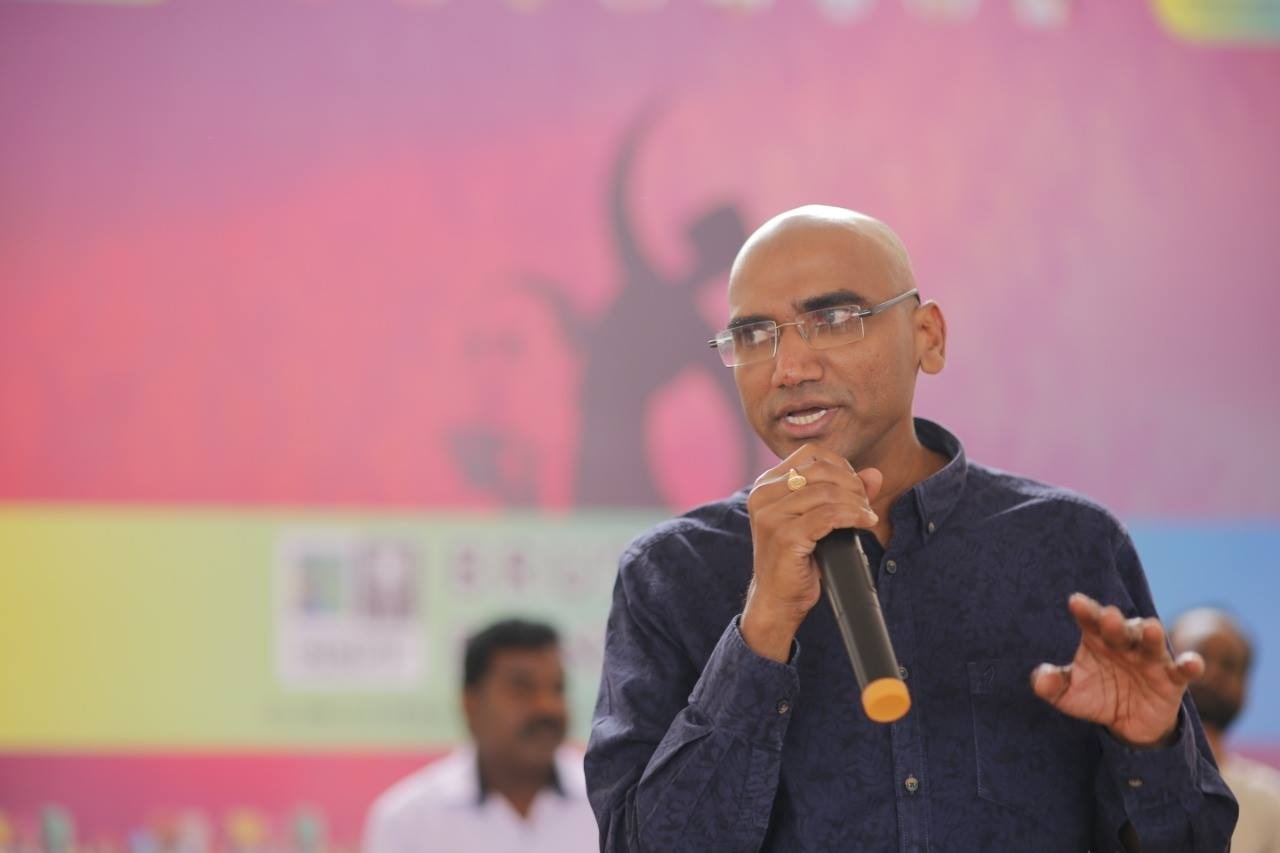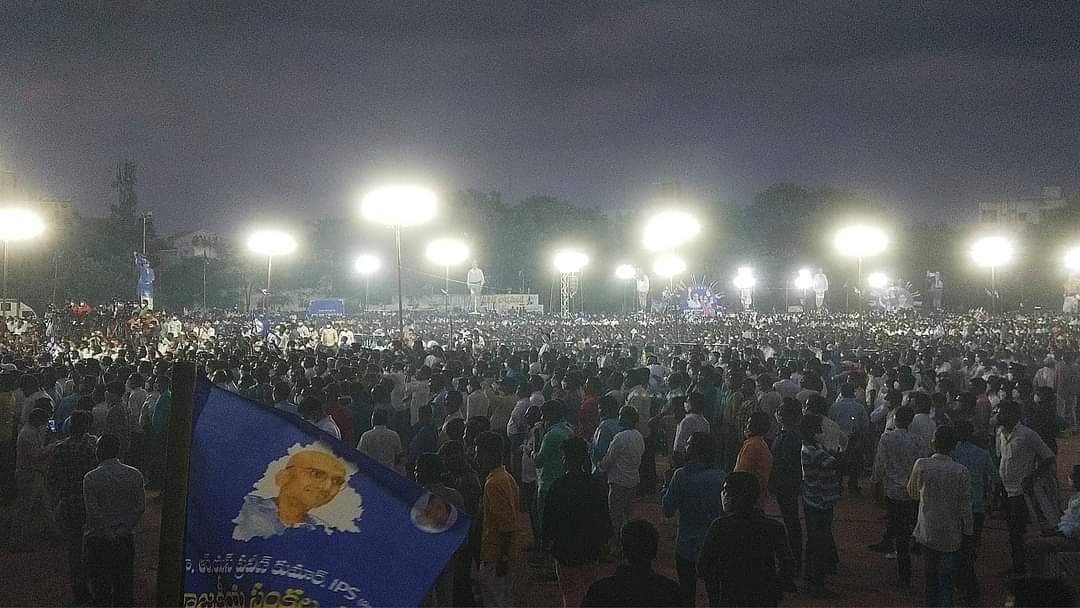
Telangana: Can this former super cop revive politics of social justice?

The slogan of ‘social justice’, long-forgotten in Telangana, rent the air in Nalgonda town last evening. Led by former IPS Officer RS Praveen Kumar, who resigned from the service last month, thousands of people, who attended the public meeting, organised to formalise his entry into the Bahujan Samaj Party (BSP), vowed to empower the Bahujans.
Kumar, an IPS officer of the 1995 batch, exhorted, “you can ride to Pragati Bhavan if you mount the elephant (the BSP’s symbol)”. Pragati Bhavan, reportedly built at a cost of ₹100 crore recently, is the fortress-like official residence of the Telangana chief minister which symbolises political power.

The word social justice entered Telugu politics as an election slogan on August 26, 2008 when Chiranjeevi, the movie star-turned-politician raised voice for social justice from Tirupati.
Surrounded by huge portraits of social justice icons such as Mahatma Jyotirao Phule, Ambedkar, and Mother Teresa, Chiranjeevi launched his political party Prajarajyam. Until then, the word social justice was seldom heard in the popular political discourse and was confined only to the internal debates of political parties.
Despite its initial hype and support from lower castes, Prajarajyam could not make a breakthrough in the 2009 elections. It just won 18 seats in the Assembly of 294 which eventually led Chiranjeevi, an upper-caste Kapu leader, to merge it with Congress for a share in the power at the Centre in 2011, rendering a fatal blow to the politics of social justice.
The next blow was dealt by the bifurcation of Andhra Pradesh which established the hegemony of upper castes in the two successor Telugu states. Taking cue from the electoral success of Telengana Rashtra Samithi (TRS) in the 2014 elections, KCR conveniently jettisoned his own assurance to make a Dalit the first chief minister of the Telangana state.
Also read: Why Sharmila is banking on Telangana Reddys to realise ‘Rajanna Rajyam’ goal
Now, RS Praveen Kumar, who hails from the Madiga Dalit community and is a man of proven commitment to oppressed classes, wants to revive the social justice politics in a state where SC, ST, OBC, and minorities form a vast majority.
Praveen’s credentials as a man of social justice are impeccable. His travel from super cop to SWAERO was a metamorphosis of sorts. While as police superintendent, he represented the ruthless face of state power as one witnessed in the liquidation of Naxalites in alleged fake encounters, as the secretary of Social Welfare Residential Schools Society he acquired a cult status among the poor Dalit and OBC families.
The residential schools with the strength of 4 lakh students under his command have become Centres of Excellence. The wards drawn from the poorest of the poor sections excelled in every sphere. They acquired command over English like those in corporate schools. The members of his army called SWAEROS (SW stands for social welfare and AEROS is the sky in Greek; euphemistically sky is the limit for the wards of social welfare hostels) scaled the highest peaks of the world including the Everest, were selected for many national institutes, won laurels in sports, were awarded scholarships from US Universities among other accomplishments. No doubt, he is the most recognisable face and the epitome of hope for the poor in Telangana now.
Is this enough to lead a political party in Telangana where chief minister KCR tethered every caste to cash-transfer schemes?
The road ahead for Praveen Kumar, who is appointed as the state coordinator of BSP, is fully potholed. First, the BSP has never been accepted by the people of Telangana. Though many former Naxalites, intellectuals, and bureaucrats joined the party, inspired by Kanshi Ram’s ideal of Bahujan Samaj, the BSP failed to gain toehold here. It is seen basically as a North Indian party and always identified with scheduled castes. So, the BSP has become a preferred party for those who wanted to contest from a recognised outfit.
The initial euphoria generated by Kanshi Ram in 1994 when people spontaneously attended his meetings in lakhs died down in no time. In the post-Kanshi Ram era, none of the attempts made by BSP chief Mayawati met with success. Even her alliance with movie star Pawan Kalyan of Janasena, before 2019 general elections, could not breathe life into the party in Andhra Pradesh.
From the perspective of the people, BSP is a non-entity in Telugu states. Riding to Pragati Bhavan on elephant against this backdrop sounds like pure rhetoric. Because forging unity between BCs and SCs is a difficult task if not impossible, in a society where people are not ready to sacrifice their established caste hierarchies.
Also read: Amid pandemic, KCR’s car bonanza for bureaucrats kicks up a storm
According to E Venkateshu, professor of Political Science, Hyderabad Central University (HCU), the chances of BC and Dalits coming together are bleak given the antagonism between these two sections.
“Backward Castes at a grass-root level have never been receptive to the BSP. There is a deep-seated sociological division between these groups. No serious attempt has been made on the need to forge an alliance between them in Telugu states barring some election-time talk. The Bahujan concept has not percolated down to the masses in Telangana. It is still an elitist idea confined to urban areas. The success of Praveen Kumar depends on his ability to present a common political agenda that suits these two divergent groups equally,” Venkatesh told The Federal.
He also added that Praveen’s Telangana agenda should remain immune to possible political alliances between Mayawati and BJP in the future.
Dr Satish Chennur from Centre for Studies in Social Science, Kolkata said working as an individual with a spirit of social justice without any political objective is different from implementing a party’s programme.
“Dalit and Backward Class unity still remains a theoretical possibility. Attempt to achieve this on the ground have not yielded any tangible result. Praveen has to achieve this if BSP were to become the umbrella for all the Bahujan communities. It should not be an election-centric attempt,” Satish, a Dalit sociologist who studied caste politics in Andhra Pradesh, opined.
Suman Damera, a Dalit student leader from Warangal said uniting SC and BC is very difficult in a society where Sanskritised BC communities practice apartheid with Dalits. Suman, who studied the changing dynamics of SC-BC conflicts in Telugu states for the doctoral programme at HCU, admits that Dalit-OBC unity is the need of the hour, and it can’t be achieved just for electoral purposes. “In Telangana, primordial caste identities are stronger where people love to be led by upper castes than the lower castes,” Suman said.
Telugu states present a curious phenomenon. Though these states have produced great Communists, Gandhians, and upper caste leaders, they are yet to produce a reformer from lower castes. Tallest BC icons like Konda Lakshman Bapuji, Gouth Latchanna, and their ilk could not break free from party politics and emerge as social reformers. The regions also missed out on the anti-Brahmin movement that would have brought a wider social alliance. The historic Telangana movement was a politico-economic movement without any social reform ideal.
As the lower castes divided on their respective castes identities, a couple of upper castes with their money power took control of the political power and are trying to perpetuate their hold with populist programmes.
Praveen Kumar has to regain acceptability first among the castes and sub-castes among the Dalits and OBCs to catapult to power.


